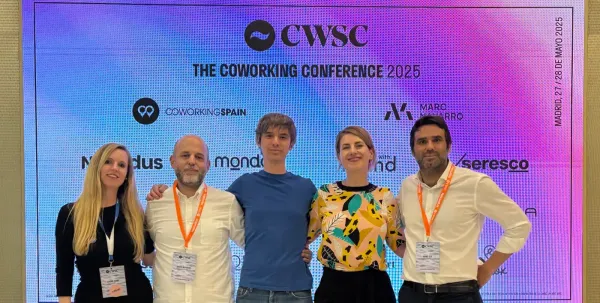The Cobot team has just arrived back in Berlin from a week spent in Goa, attending one of our favorite events of the year: the Coworking Unconference Asia (otherwise known as CU Asia! Here are a few of our takeaways and lessons learned over our productive and enlightening week in India.
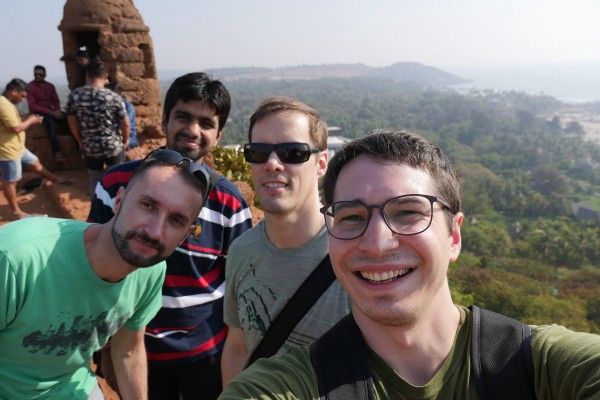
We began by touring the town of Panjim and the surrounding areas. It is a beautiful area on the Western coast of India, just a few hours drive south from Mumbai. We arrived a couple of days before the event was scheduled to start, so we found some time to visit 91Springboard (the local partner of CU Asia) and get some work done!
Day 1: India, Asia, and Beyond
The event officially began on February 22nd at the Clube Tennis De Gaspar Dias. Steve Munroe and Renee Martyna opened by detailing the many virtues of coworking in Asia, particularly India. For starters, it’s a young and vibrant country, full of entrepreneurs and visionaries, but they are also looking outward; many of the reasons that these spaces excel is because they are taking lessons from established spaces and programs all over the world. In their words: “Asia is the best. India is (really) the best.” They also offered up their personal advice and laid out the main theme of the conference: “How, when we scale, do we retain our heart?”
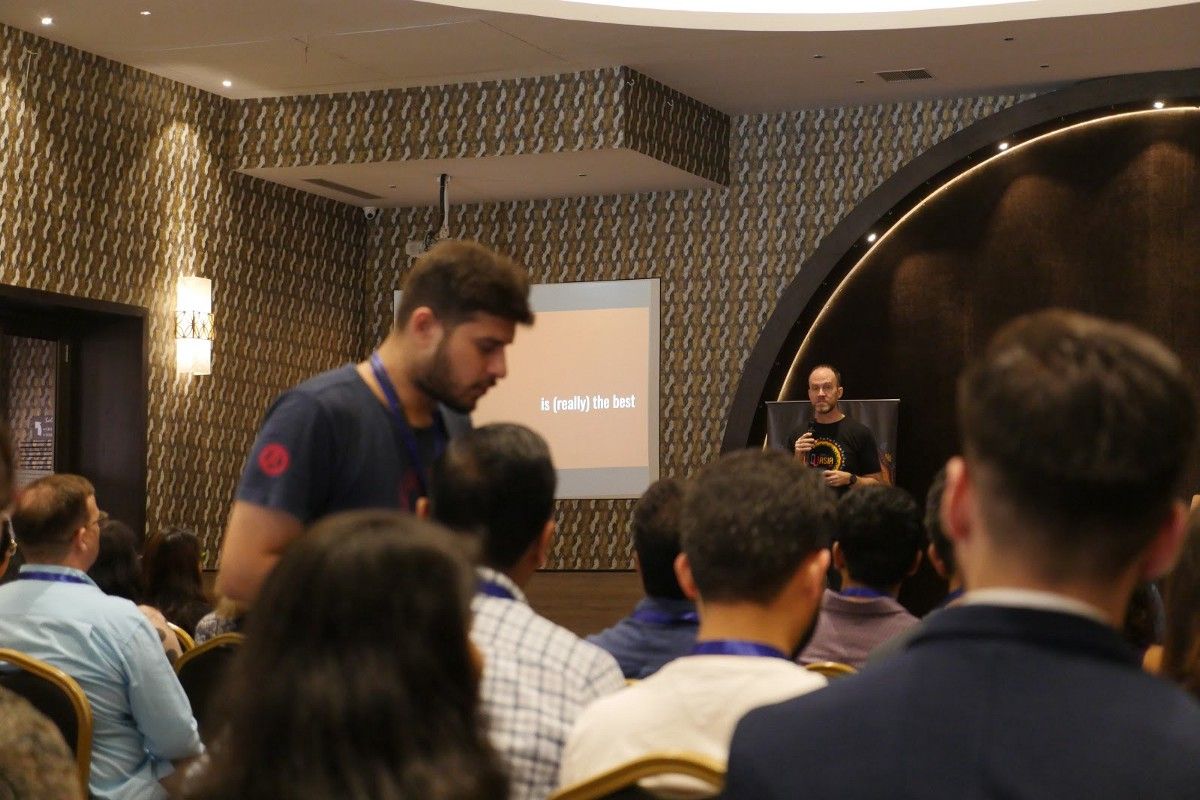
Their four kickoff points:
- The pain pushed until the vision pulls.
- It’s not about the space.
- Money matters; but it’s not the main motivator.
- The people that start things are not the people to finish them.
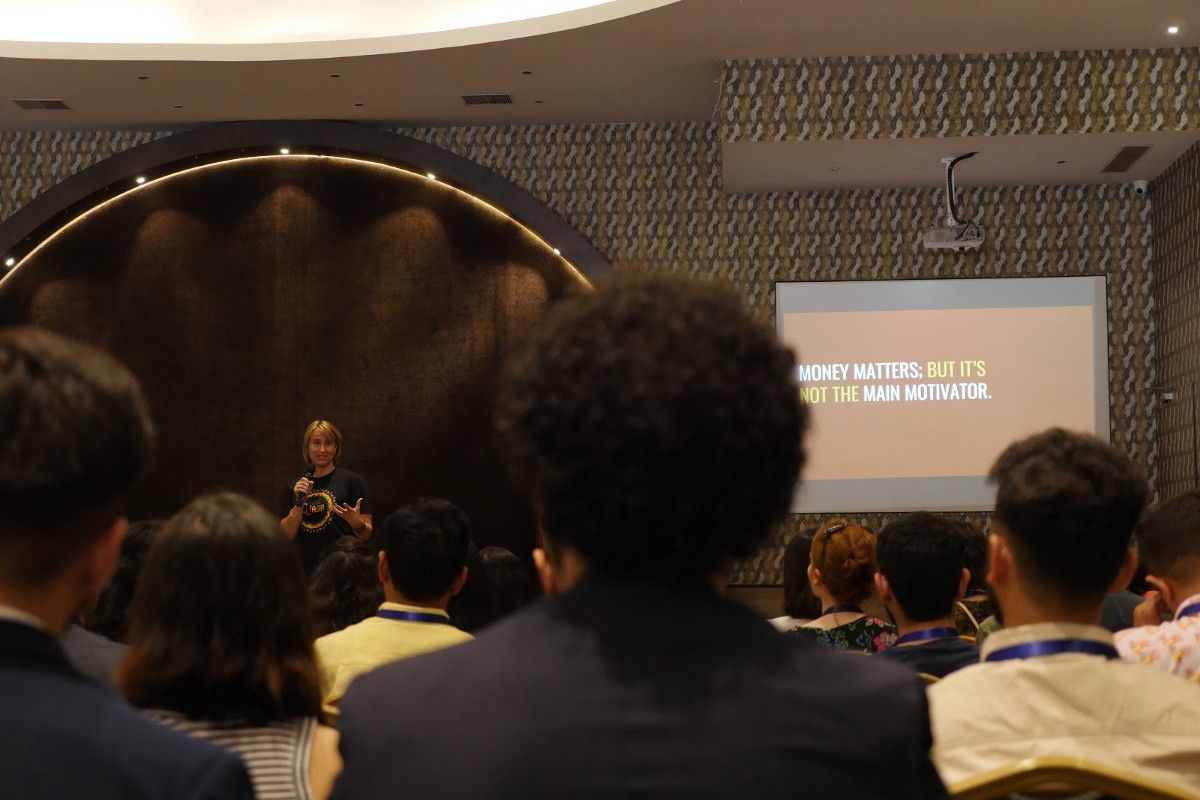
They challenged us all to tell the truth at least once during the conference. A task we were more than willing to take them up on!
After a spontaneous dance number and a short tea break, Jaanus Juss from Telliskivi Creative City began his talk on Building a Thriving ‘Creative City’ in Estonia. His space in Tallinn was a community incubator located in a decrepit and run-down neighborhood, but through community outreach and organizing they revitalized the whole area. Their organizing principles are that they will only accept members who are a good fit, even if they leave vacancies, and that the majority of their members will pay rent subsidized by those who can afford it. Their community-centric model was a bold vision of how to make a space that rejects corporate influence and outside pressure while still finding massive success.
The next speaker, Mahdi Shariff, spoke on the topic of Driving Value from Revenue to Exit — How to Harness the Power of Data, AI, and Meaningful Communities. He approached the topic from the perspective of someone used to analyzing data, and paid particular attention to the KPIs that spaces should use to track community. In his opinion, organic vs. inorganic growth, engagement with events, and other interactions with the space are good starting points to see how strong your community is and leverage that value to attract potential investors or customers.
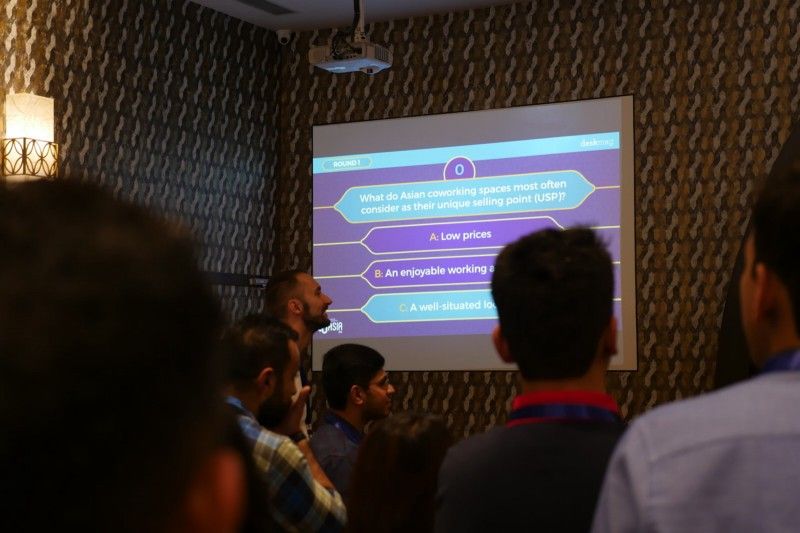
Deskmag announced the results of their 2018 Asian Coworking Survey with a game of Who Wants to be a Millionaire. The results were mostly familiar to anyone who has seen the results from Asia’s worldwide counterparts, with the exception of one answer, to the question of what most spaces consider their unique selling point. The answer was that most spaces in Asia consider their location as their most unique feature, not the atmosphere.
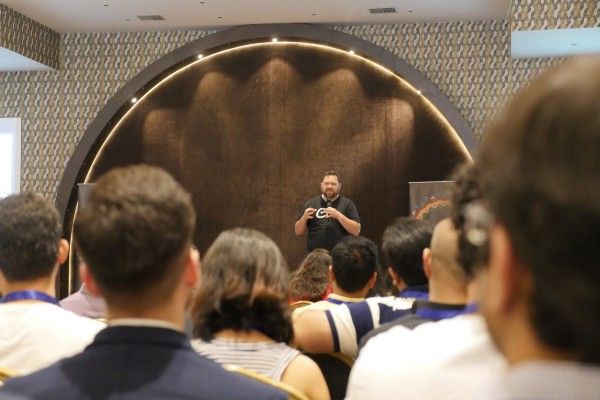
We were treated to a coworking cautionary tale with the ominous title: Who Hijacked Coworking? Lachlan Sloan, co-founder of CoLo Life, left his role at a large, scalable flexible space business because he wanted to foster a more personal, creative environment. But the success of his new space came at a cost when their team agreed to be bought by IWG, one of the largest international office space groups. His lesson from dealing with the international companies is: we need to define what coworking is beyond “shared office space.” It’s a culture of community and collaboration, one that can’t easily be converted into a corporate giant’s portfolio. And if we fail to define it ourselves, we’ll lose more ground to giant international corporate chains.
Finally, we heard from Marcela Fernandez in This is Not a Hostel Talk: Meet SELINA. Selina is a co-living space that is rapidly expanding across the world, bringing a vision of what co-living can mean independently from hostel life. Among the interesting facts were a few about what distinguishes their brand ina world where it is getting harder to find a niche. She said that they wanted a name that was recognizably female in every language, to get the point across that it is a company led by women; and that they take aesthetics as seriously as their other business aspects.
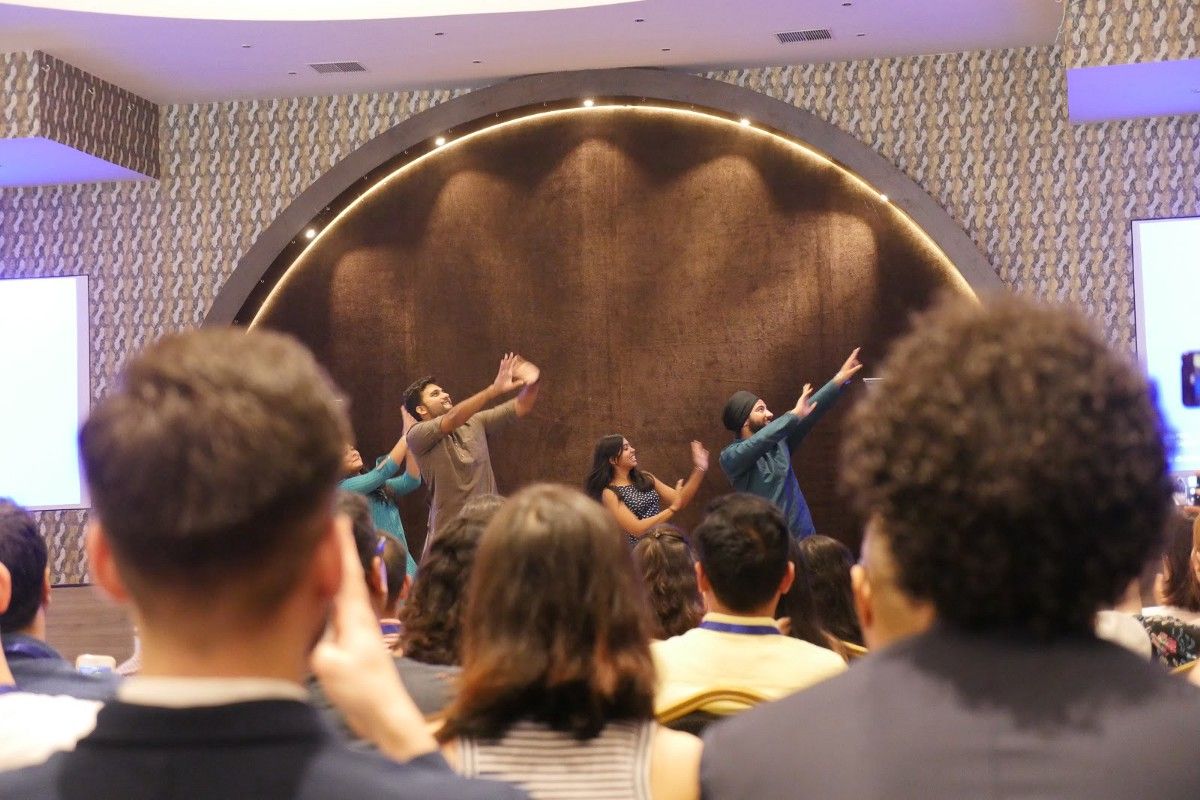
The rest of the day was spent at the beautiful Old GMC Complex, where we sat in on a variety of organized talks.
We started the sessions by going to The Waking Giants: Commercial Real Estate Firms are Really Entering the Fray, led by Steve Munroe, Ashish Goenka, Ben Eckblad, and Anuj Nangpal. The discussion focused around the differences between multinational firms and independent spaces, what they can learn from each other, and focusing on our strengths. One of the main points was that small spaces don’t necessarily have to worry. Landlords may think that coworking is an easy market to get into (just put some desks and a coffee maker in your unused space!) but it’s hard to break in without either passion and talent or an incredibly large company that can work on economies of scale. For now, independent spaces can focus on what they do best and continue to thrive.
One of the challenges of worldwide coworking growth is that small spaces lose their ability to influence the global conversation, and there’s a need for independent and smaller networks to “take coworking back.” That’s why we were excited to hear about this session on Federations and Partnerships Within Coworking. An answer to this enormous question is that we need to keep building out networks and creating/joining coworking federations. A broad consensus was that it’s better to start small, join together with spaces in your city, your state, and your country, in that order. It’s ok to start with a loose structure and figure out your goals from there. Another point was that if someone is attracted by the perks of a large, faceless corporate space, nothing you do will keep them in yours, so don’t try to get those people. Instead, work together to push a vision of what coworking is and can be. Your current and potential members will appreciate you for it.
At Partners In All Things, Steve Munroe and Renee Martyna led a session on the challenges of running a coworking operation with your partner. They spoke about their ways of managing time (it’s impossible to not discuss work outside of work, but you still need to set boundaries), finances (absolutely need to be separate!) and clarity (think of long vs. short term goals, define what you want to get out of both the relationship and business separately). It can be hard to find a dynamic that works for everyone, but clear and consistent communication are key to making any strategy work.
Day Two: The Unconference Begins
A question that often comes up in our line of work is: how do we get busy people to engage with the space? It’s a challenge when the cornerstones of your community are so busy that they can’t find the time (or make the time) to attend events and meet other members of the space. At Coworking Beyond the Desk, some solutions discussed included charging for events to get buy in and get a better picture of who is actually interested, offering some events to the public but giving a discount to your space’s members, and getting members to organize events themselves and promote those.
Another part of the discussion was around the issue of getting people involved in issues that the space feels are important, such as environmentalism and mindfulness, when members might feel intimidated. Some suggested that spaces should start small and use regular times right from the beginning, instead of one-off events. Saying “we meet and clean the beach every Tuesday at 16:00” or “Looking to focus better, sleep better, and work better? Join our introduction to mindfulness sessions the first Sunday of every month” are better at drawing people in.
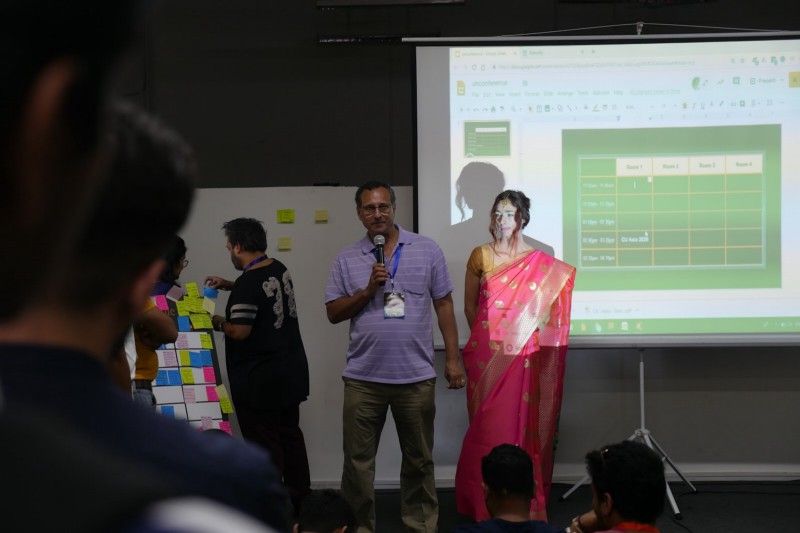
Our very own Thilo Utke led a discussion on Tech Enablers for Coworking and Community. Many of the participants were eager to hear what software had helped others’ spaces tackle everyday challenges. Some people wanted more integrations, others were looking for ways of bridging communication gaps between spaces internationally. A big takeaway is that you need to work with the technology and software that your employees/members are using, not against it. If one of your spaces is using WhatsaApp, another Slack, and the other is only Facebook, don’t try and add another mode on top of those.
Some apps that were suggested during this session for helping to run a space were: Asana (team management), DeskTime (time tracking), TimeDoctor (tracking and productivity), HubStaff (employee time tracking), Skedda (booking and scheduling), Tawk.to (chat with website visitors), and Seats2Meet (offline community building).
A particularly interesting topic was Women and Entrepreneurship, Can Coworking Do More? The discussion centered around programs and designs to support women already in the space and encourage more women to take up the mantle of entrepreneurship. A member of 91Springboard in New Delhi shared the details of a successful program called the Women Entrepreneurs League (WE League), which connected women entrepreneurs and ran events created by, and for, them. Unfortunately, they had some trouble scaling it, suggesting that there needed to be more specialized solutions, even within the same organization.There was pushback on the idea of adding quotas for women in programs, and the general consensus was that when running programs you shouldn’t ask for participant’s gender at all. Providing a platform for internships and mentoring was also suggested as a simple way to start building networks and encouraging more positive developments. Having a community manager who could have private and meaningful conversations with women in the space was seen as a key in identifying what would be most useful.
Joy from WIRE in Queensland shared details of the program they’ve been running for 2 years. The program consists of webinars, events, and an accountability program all designed to promote women-led enterprises in rural Australia. The idea behind having so many avenues is that it encourages people to start small but gives them ways to increase their participation, without requiring a large time/energy committment up front.
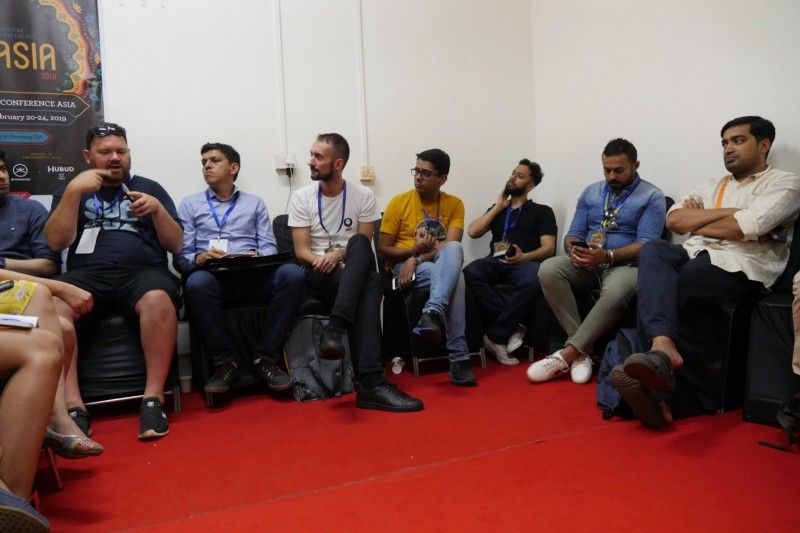
We also sat in on a session on Community Metrics. This is an important topic for many of our spaces, since it is both an essential part of success and a notoriously elusive statistic to measure. After much discussion, a few metrics rose to the top:
- How long your members stay in your space (stickyness).
- How many interactions you have with members.
- Recommendations and referrals.
- Jobs found through your space.
- Content generated by members.
- Time spent in neighborhood.
- Find a success point that you’re aiming for and build your community towards that goal.
Another topic that we found interesting was Building Online Communities. They present a completely separate challenge from offline communities, and while many spaces have stories of trying to enhance their community online, very few could say they succeeded. A few takeaways were that you need to know why you want to build one before you start. Is it to share events? Share job postings? Communicate after hours? If you can’t articulate more than a vague reason, your efforts are doomed to fail. And you have to find what makes you more useful than the channels your members are already using, like Facebook and WhatsApp. The success stories tended to boil down to either communities of practice, or communities of value.
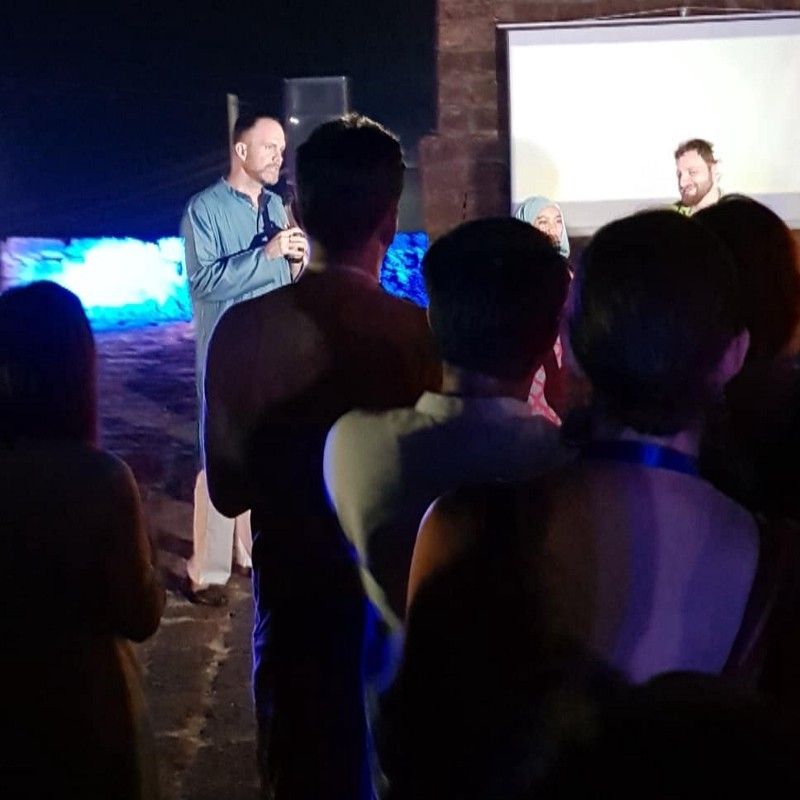
The day winds down, and we start to think about next year.
The conference wrapped up with a party at Reis Magos Fort, a historic, 16th century fortification that looks across the bay at the city of Panjim. There was traditional food, dancing, and singing, accompanied by a truly spectacular view. At his closing speech, Steve Munrow announced that next year’s unconference will be held in Bali — is it 2020 yet?
Cobot helps coworking businesses around the world to effectively manage their spaces. You’ll find that our features can help you run your coworking space more efficiently and grow a healthy, and happy, community. Want to try it out to see how Cobot can help you automate your daily administrative tasks? Just sign up for a free trial or a live demo session and reach out to our support to learn about our available discounts.
Happy Coworking!


